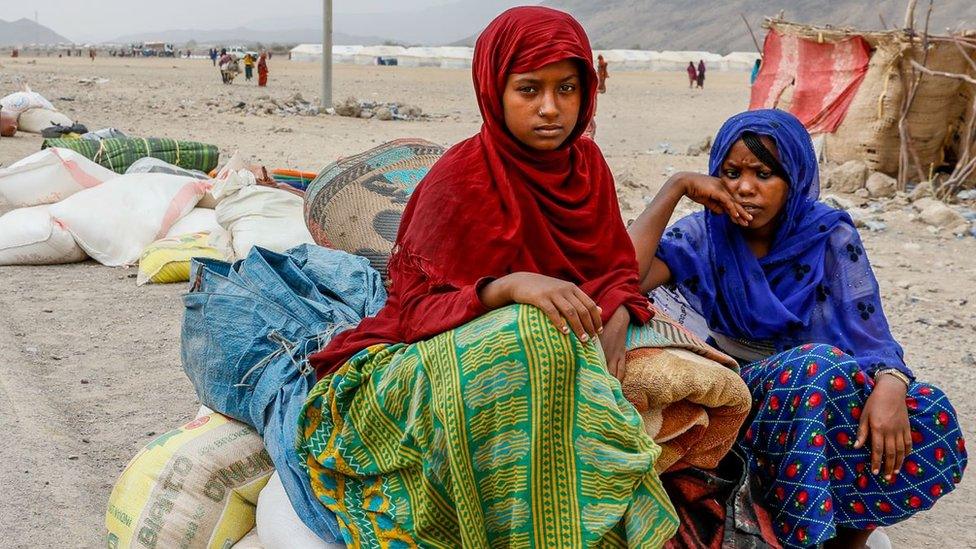Ethiopia's Tigray war: TPLF agrees to humanitarian truce
- Published

Some aid has reached regions neighbouring Tigray
Rebel forces fighting in northern Ethiopia have agreed to a government offer of a truce to allow aid deliveries to reach millions of people in urgent need of assistance.
No aid has been delivered to the Tigray region since mid-December, with the government accused of imposing a blockade. It blames rebel forces.
The TPLF rebels said they would respect the ceasefire as long as aid deliveries resume "within reasonable time".
The 16-month war has killed thousands.
More than two million people have been forced to flee their homes.
The head of the World Health Organization (WHO) Tedros Adhanom Ghebreyesus, who is from Tigray, has described the situation there as "catastrophic".
In January, the World Food Programme said that almost 40% of Tigrayans, external were suffering from what it called "an extreme lack of food". It also found that half of all pregnant and breastfeeding women were malnourished.
Some nine million people need aid in Tigray and neighbouring regions, which have also been affected by the fighting.
Tigray has also been hit by a communications blackout with the internet and phone services cut.
An unknown number of people have died from hunger or the lack of medical supplies. Conditions have been so bad, even doctors have been forced to beg for food.
The United Nations says at least 100 humanitarian lorries are needed to transport aid every day to the region.
The US, UN and European Union have all welcomed the truce, which follows a visit to Ethiopia by US Special Envoy to the Horn of Africa David Satterfield.
EXPLAINER: What's stopping aid reaching Tigray?
BACKGROUND: Ethiopia's Tigray war - and how it erupted
In its statement on Thursday, external, the government said that the truce was "indefinite" and "effective immediately", but added that it would only improve the lives of people in the north of the country if the move was reciprocated.
It called on the Tigrayan forces to "stop further aggression and withdraw from areas they have occupied in neighbouring regions".
In response, the Tigray People's Liberation Front (TPLF) said it "will do everything it can do to make sure this cessation of hostilities is a success".
Fighting broke out in November 2020 following months of tension between the federal authorities and the TPLF, which governed Tigray, Ethiopia's northernmost region.
Within weeks, Prime Minister Abiy Ahmed said the conflict was over when federal forces took the regional capital Mekelle. But the TPLF later fought back and regained control of much of Tigray.
When the rebels retook Mekelle last June, Mr Abiy declared a unilateral ceasefire. But the TPLF said it would not observe this unless it was recognised as the legitimate authority in Tigray.


News of the truce announced by the federal authorities in Ethiopia and the subsequent commitment to cessation of hostilities by the TPLF is being welcomed with a measure of scepticism. The situation on the ground is complex - rivalries run deep and the civil war has attracted other actors that include regional forces and militia.
Previous ceasefire announcements failed to translate into better conditions for people and humanitarian access.
"We will believe it when we see the trucks with life-saving humanitarian aid reach Tigray," said one commentator on Twitter.
Beyond the announcements and getting aid to those who need it, it would appear expectations vary. The TPLF says it wants the political and humanitarian issues de-linked. However, US Secretary of State Anthony Blinken said: "It should also serve as an essential foundation of an inclusive political process."
The starting point, however, would be to see the movement of aid supplies by road get to the people who desperately need them in Tigray.

